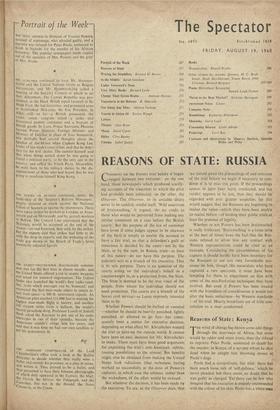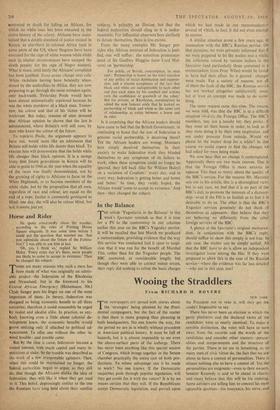Reasons of State: Kenya
THE wind of change has blown some odd things through the doorways of Africa, but none would be odder and more ironic than the refusal - to reprieve Peter Poole, sentenced to death for the murder, in Kenya, of a servant whom he shot dead when he caught him throwing stones at
Poole'S dogs.
Poole had a scrupulously fair trial: there has been much loose talk of 'self-defence,' which he never pleaded, but there seems,no doubt that he was guilty as charged. Yet there can be few who imagine that his execution is entirely unconnected with the colour of his skin. Poole was a white man sentenced to death for killing an African, for which no white man has been executed in the entire history of the colony. Africans have main- tained that a double standard of justice existed in Kenya, as elsewhere in colonial Africa (and in some parts of the US, where Negroes have been executed for the rape of white women while white men in similar circumstances have escaped the death penalty for the rape of Negro women). What is more, until lately the Africans' complaint has been justified. Nous avons change tout cela.' White racialism having been belatedly aban- doned by the authorities in Africa, they are now preparing to go through the same mistakes again, only backwards. Yesterday Poole would have been almost automatically reprieved because he was the white murderer of a black man. Tomor- row, his colour and that of his victim will be irrelevant. But today, reasons of state demand that African opinion be shown that the law is administered, where Britain's writ still runs, by men who know the colour of the future.
To reprieve Poole, the argument appears to have run, would seem like an admission that Britain still holds white life dearer than blacK. To execute him will demonstrate that she holds white life cheaper than black opinion. It is a savage irony that future generations in Kenya will be able to point to 1960 as the year when the equality of the races was finally demonstrated, not by the granting of rights to Africans to farm on the White Highlands, or to become members of the white clubs, but by the proposition that all men, regardless of race and colour, are equal on the end of a rope. Justice is commonly portrayed as blind; one day, she will also be colour blind; but not, it seems, just yet.



































 Previous page
Previous page